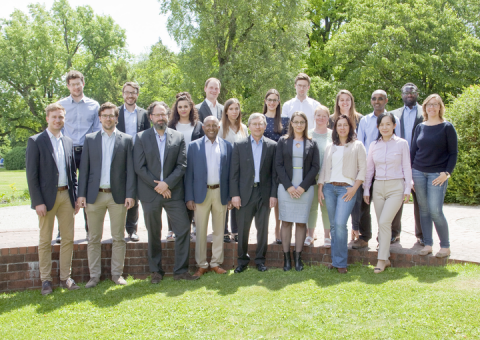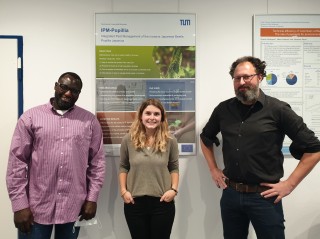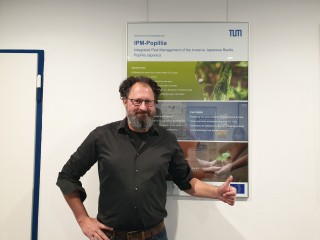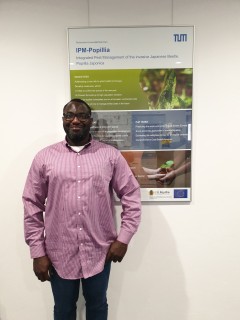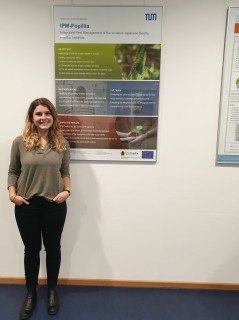About TUM
The Technical University of Munich (TUM), founded in the year 1868, is a leading university in fields such as environmental sciences and engineering, medical technology and biotechnology or agricultural sciences and food science, and is repeatedly rated as one of Germany´s and Europe´s top universities. The QS World University Rankings 2022 recognized TUM as Germany´s best technical university and 50th in the world. Moreover, the "Shanghai Ranking" awarded position 52 to the Technical University of Munich and therefore rated TUM among the six best technical universities in the world. Apart from its campus in Munich, TUM has three other main locations and one of them is the campus Weihenstephan in Freising. The modern campus Weihenstephan has been established in the year 2000 and accompanies various science fields and disciplines that deal mainly with life sciences.
More information:
At a glance: The Technical University of Munich
The TUM School of Life Sciences - the center for integrated life sciences
About PuR
We, the Chair Group of Agricultural Production and Resource Economics of TUM or PuR for short, are located at the campus Weihenstephan, in the beautiful town of Freising, which is only around 30 minutes away from Munich. Our Chair is specialized in conducting theoretical and empirical microeconomic analysis in the fields of agricultural and resource economics. In this regard, we are especially interested in questions related to production and efficiency analysis, innovation and technology, rural development, climate change and ecosystems. By identifying and estimating trade-offs or potential synergies, we can provide policy advice in the aforementioned fields, which aims at increasing productivity and simultaneously saving resources and promoting sustainability. Hence, in our research we seek to find balance between the economy and ecology. In order to do so, our group is not only well trained in microeconomic theory and the application of statistical and econometric approaches, but we also pay special attention to find and apply interdisciplinary methods and solutions. In this context, we highly value our established research alliances in Germany and abroad and the collaborations with our partners of the several international projects that we are involved in.
More information:
Welcome to the Chair Group of Agricultural Production and Resource Economics
Our work in the IPM-Popillia project
The TUM team is responsible for the socio-economic evaluation of the Japanese beetle invasion across Europe. It is important to get more knowledge about the impacts of a possible Japanese beetle spread to provide justification for pest management expenses and to find the most efficient control methods. This means that we compare potential risks and economic damages caused by the Japanese beetle, as well as possible costs and benefits of pest management approaches. In addition, our team assesses conventional and alternative pest control strategies that are being applied against the Japanese beetle from an economic perspective. Here, our objective is to also consider the preferences of farmers regarding the different control options. Their opinion is a crucial factor, as the control of the Japanese beetle can only be successful if advised control methods are manageable, practically, and will also be implemented in the end. Ultimately, our goal is to contribute to the development of a sustainable Japanese beetle management within Europe.
Our Team
Prof. Dr Johannes Sauer
I am full Professor and Head of the Chair Group of Agricultural Production and Resource Economics at the Technical University of Munich since 2013. In the IPM-Popillia project, I act as TUM team leader and Co-Coordinator of the project. As I grew up on a mixed farm with animal and crop production and helped my parents with the work, especially when they were on vacation, I got to learn a lot about managing a farm from an early age on. Therefore, working on finding solutions for farmers and the society to problems like the Japanese beetle has always been of interest to me. In general, I am fascinated with the interplay of resources and technology, as well as to look at its economic and policy side based on data driven evidence.
I achieved my Master´s in Agricultural Economics at the Imperial College London in the United Kingdom, and my Ph.D. in Agricultural Economics at the University Bonn in Germany. With previous positions located in France, Denmark, Norway, UK, or the United States, I was able to expand my international focus and acquire valuable know-how in the fields of agricultural and resource economics from a global perspective. Probably those experiences also influenced my preference for collaborative and interdisciplinary research work. My main research areas include the analysis of production and efficiency, the adoption of technology and sustainable innovation, bioeconomy and policy evaluation, as well as microeconometric modelling and risk analysis. I currently oversee about 20 ongoing research projects at the chair group.
Dr Emmanuel Benjamin
I am senior researcher at the Chair Group of Agricultural Production and Resource Economics headed by Professor Sauer. Coming from a suit and tie financial service career I dived into the field of development and agricultural economics, where I have gained substantial international expertise in project coordination and management. Moreover, I have overseen applied research relating to sustainable farming practices, technology adoption and climate change. In my job, I do not only enjoy teaching and passing on knowledge, but I especially appreciate projects in which you can apply and implement theory of change.
Franziska Straubinger
I started working as a research associate and doctoral candidate at the Chair of Professor Sauer in November 2020 and am therefore the newest member in our team. Before joining TUM, I have achieved my Master´s in Economic Development and Growth from the Universidad Carlos III de Madrid in Spain. Not only my education but also previous experiences, for example as an intern at the Biodiversity and Forestry Department of the Deutsche Gesellschaft für Internationale Zusammenarbeit (GIZ) GmbH in Ethiopia, have deepened my interest in research questions related to the fields of agricultural, development and environmental economics. Additionally, I really enjoy working in an international environment and am happy to be part of this Europe-wide collaboration that develops environmentally sound and efficient tools to control this invasive beetle and prevents it from spreading.


